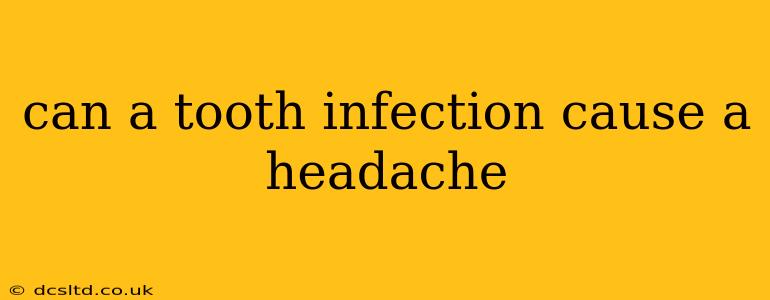Yes, a tooth infection, also known as an abscess, can absolutely cause a headache. The pain isn't just limited to your mouth; it can radiate and significantly impact other areas of your head and face. This is because the nerves in your teeth and jaw are closely connected to the nerves that supply your head. An infection can irritate these nerves, leading to throbbing pain, pressure, and even migraines.
Let's delve deeper into this connection and explore some frequently asked questions.
Why Does a Tooth Infection Cause a Headache?
The intricate network of nerves in your head and jaw is the key to understanding this connection. A tooth infection triggers inflammation and pressure buildup within the infected tooth and surrounding tissues. This pressure can spread, affecting the trigeminal nerve, a major nerve responsible for sensation in your face, including your teeth, jaw, and temples. The resulting irritation can manifest as a headache, often focused on one side of the head, mirroring the location of the infected tooth.
Moreover, the infection itself can release toxins into your bloodstream. These toxins can cause systemic inflammation, contributing to headaches and other systemic symptoms. The severity of the headache will often depend on the severity and location of the infection.
What Type of Headache Does a Tooth Infection Cause?
The headache associated with a tooth infection can vary. It's not always a classic throbbing migraine; it can manifest in several ways:
- Localized Pain: The pain may be concentrated in the area of the infected tooth and surrounding jaw, often radiating to the temples or forehead on the same side of the face.
- Throbbing Pain: This is a common characteristic, similar to a migraine but often more localized.
- Pressure Headache: A feeling of intense pressure in the affected area of the head and face.
- Constant Dull Ache: Some individuals experience a persistent, dull ache rather than sharp, throbbing pain.
How Long Does the Headache Last?
The duration of the headache depends on the severity of the infection and the treatment received. If left untreated, the headache could persist for days or even weeks. However, with appropriate dental treatment (usually involving root canal therapy or extraction), the infection should clear up, and the headache will typically subside within a few days of treatment.
Can a Tooth Infection Cause a Migraine?
While not directly causing a migraine in the classic sense, a tooth infection can trigger a migraine in susceptible individuals. The inflammation and pain caused by the infection can act as a trigger for the complex neurological processes that underlie migraines. Therefore, if you are prone to migraines, a tooth infection can potentially exacerbate or initiate an episode.
What Other Symptoms Might Accompany a Tooth Infection Headache?
A tooth infection headache is rarely the only symptom. Other signs often accompany it, including:
- Severe Toothache: Intense, localized pain in the infected tooth.
- Swelling: Swelling of the gums, cheek, or face near the infected tooth.
- Sensitivity to Hot or Cold: Extreme sensitivity when consuming hot or cold foods or drinks.
- Fever: A sign of a widespread infection.
- Bad Breath: A persistent unpleasant odor.
- Pus: Visible pus may be present near the infected tooth.
When Should I See a Doctor or Dentist?
If you experience a headache accompanied by any of the symptoms mentioned above, it's crucial to seek professional help immediately. Delaying treatment can lead to complications, including the spread of the infection, bone loss, and even more severe systemic issues. Your dentist is the best person to diagnose and treat the infection.
How is a Tooth Infection Treated?
Treatment depends on the severity and location of the infection. Common treatments include:
- Root Canal Therapy: This procedure removes the infected pulp from the tooth and seals it to prevent further infection.
- Extraction: In severe cases, the infected tooth may need to be extracted.
- Antibiotics: Antibiotics may be prescribed to fight the infection.
- Pain Relief: Over-the-counter pain relievers like ibuprofen or acetaminophen can help manage pain and inflammation. Your dentist may also prescribe stronger pain medications.
In conclusion, a tooth infection can indeed cause a headache. Recognizing the connection and seeking prompt dental treatment are vital steps to alleviate pain and prevent more serious complications. Don't hesitate to contact your dentist if you suspect a tooth infection. Early intervention is key to a swift and complete recovery.
